Recently, a heavyweight argument outside the White House has once again brought the U.S. government into the spotlight. The head of the Department of Government Efficiency, Musk, and U.S. Treasury Secretary Basent had a heated exchange of insults due to their differing political views, nearly leading to a physical confrontation. Ultimately, Trump chose to support Basent's appointment proposal, raising suspicions about whether a rift has developed between Trump and Musk. This conflict not only highlights the power clash between Silicon Valley and Washington but also reveals the complex game of power balance between Trump and Musk, who have shifted from "close allies" to "checks and balances."
Looking back to earlier this year, the biggest political reform initiated by Trump involving Musk was the establishment of the "Department of Government Efficiency" (DOGE), aimed at promoting radical reforms under the banner of "streamlining government." Its core objectives mainly include cutting government spending, digitizing the bureaucratic system, and replacing human decision-making with algorithms, with a core team composed of six tech elites aged 19-25. Since Trump took office on January 20, DOGE has aggressively begun to dismantle various agencies, from shutting down the U.S. Agency for International Development to significantly reducing the number of federal employees, and even obtaining taxpayer privacy information to improve fiscal efficiency. With Trump's guidance and support, Musk has faced pressure and forged ahead, igniting a storm of radical reform in the U.S.
Related articles:
- "Ending hundreds of contracts in 18 days, Musk is leading a revolution in America with six Gen Zs"
- "Cutting hundreds of millions in contracts, what bizarre government departments has Musk's D.O.G.E discovered?"
According to data from the DOGE official website, as of April 20, 2025, DOGE has saved approximately $160 billion in total, averaging about $993.79 saved per taxpayer, with savings covering multiple areas:
Contract Terminations: 8,454 contracts terminated, saving about $30 billion. For example, terminating the Risk Management Agency's lease in Topeka, Kansas, which had an annual rent of $121,800, is expected to save approximately $964,000 over multiple years.
Grant Cancellations: 9,699 grants terminated, saving about $33 billion. For instance, terminating the U.S. Agency for International Development's grant to the Global Vaccine and Immunization Alliance Foundation, saving a total of $1.75 billion.
Lease Terminations: 643 leases terminated, saving about $300 million.
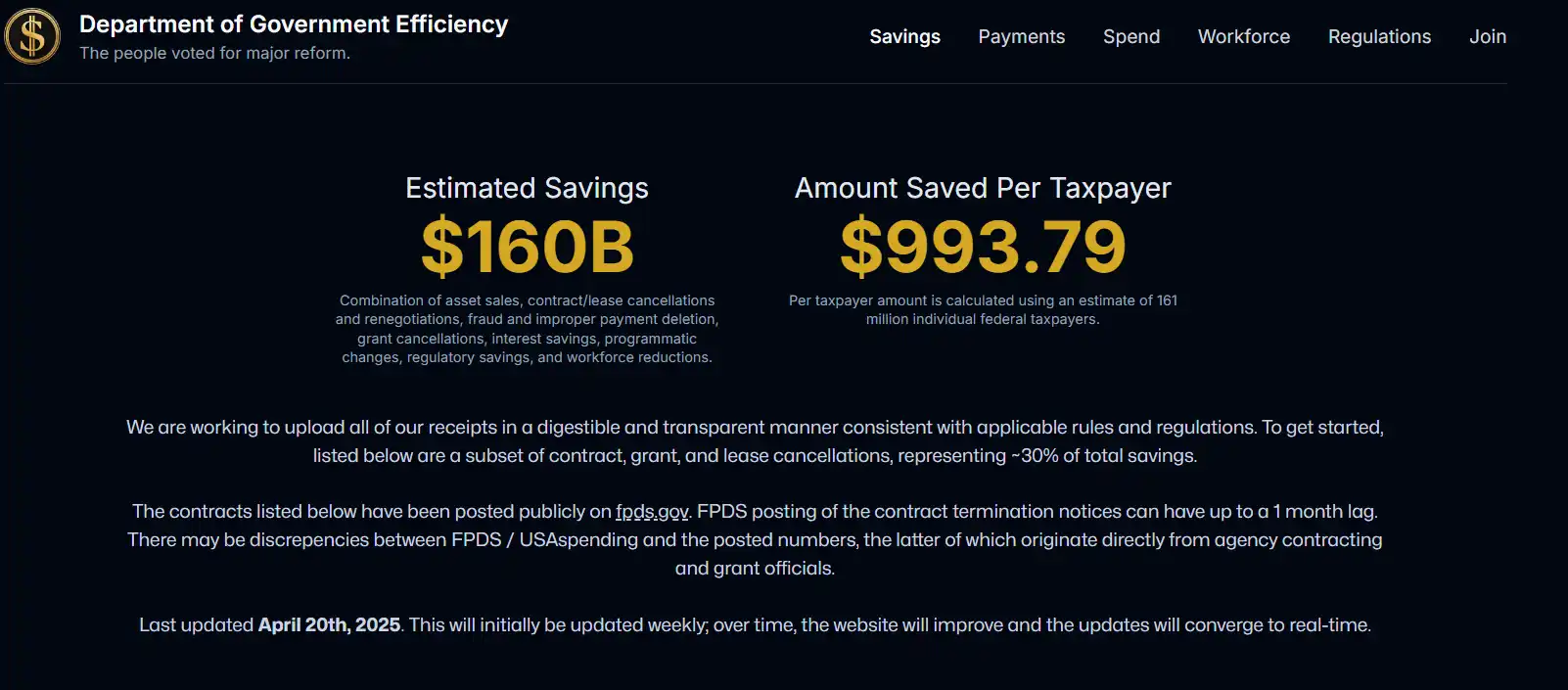
However, NPR Analysis points out that some contract terminations did not result in actual savings. For example, 794 contracts canceled are expected to yield no savings because the funds were already fully committed. Additionally, DOGE calculated savings using the potential maximum value of contracts rather than actual expenditures, which has sparked controversy.
Honeymoon Period: The "Mutual Pursuit" of Political Allies
As early as before the 2024 U.S. presidential election, Musk and Trump began frequent interactions. At that time, Musk invested $259 million, mobilizing all resources from Silicon Valley, along with his personal influence, becoming a significant boost for Trump's return to the White House. After Trump took office, Musk, as his "angel investor," naturally gained unprecedented political status and power.
On February 7, Musk publicly expressed his support for Trump on social media, stating that his love for Trump is "the greatest love one straight man can give to another man."

On March 4, while attending Trump's joint address to Congress, Musk wore a tie that Trump had lent him.
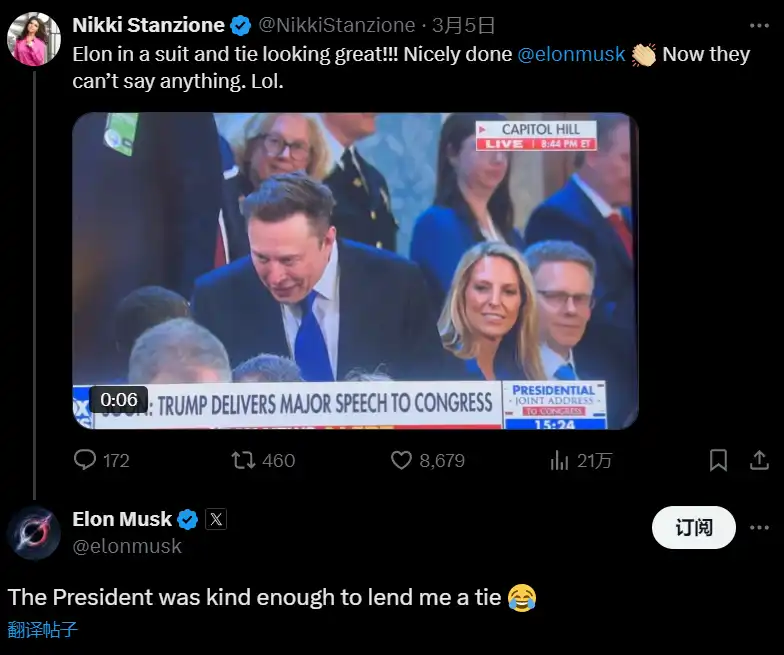
As Musk began to lay off federal employees from government agencies on a large scale, a wave of vandalism against Tesla cars, intimidation of owners, and protests at dealerships erupted nationwide. Tesla factories faced peaceful demonstrations and acts of vandalism, including fires at charging stations. Incidents of vandalism against Cybertrucks surged across the U.S., with some owners even spray-painting their own Tesla cars in protest against Musk.
Reports of vandalism and protests against Tesla cars and dealerships indicate that opposition to Musk has reached a boiling point. Baird analyst Ben Kallo stated on CNBC, "When people's cars are at risk of being scratched or burned, even those who support Musk or are indifferent to him may think twice about whether to buy a Tesla."
Musk has also repeatedly stated that running his own business is "very difficult," with Tesla's stock experiencing its most severe decline in five years, and his social media company X facing multiple outages.
However, such a vigorous reform effort inevitably harms the interests of a considerable number of people, and since Musk entered politics, the voices of opposition have been incessant. Tesla's stock has plummeted since Musk took office, nearly halving its market value, resulting in Musk's personal wealth evaporating by approximately $121 billion since the beginning of the year.
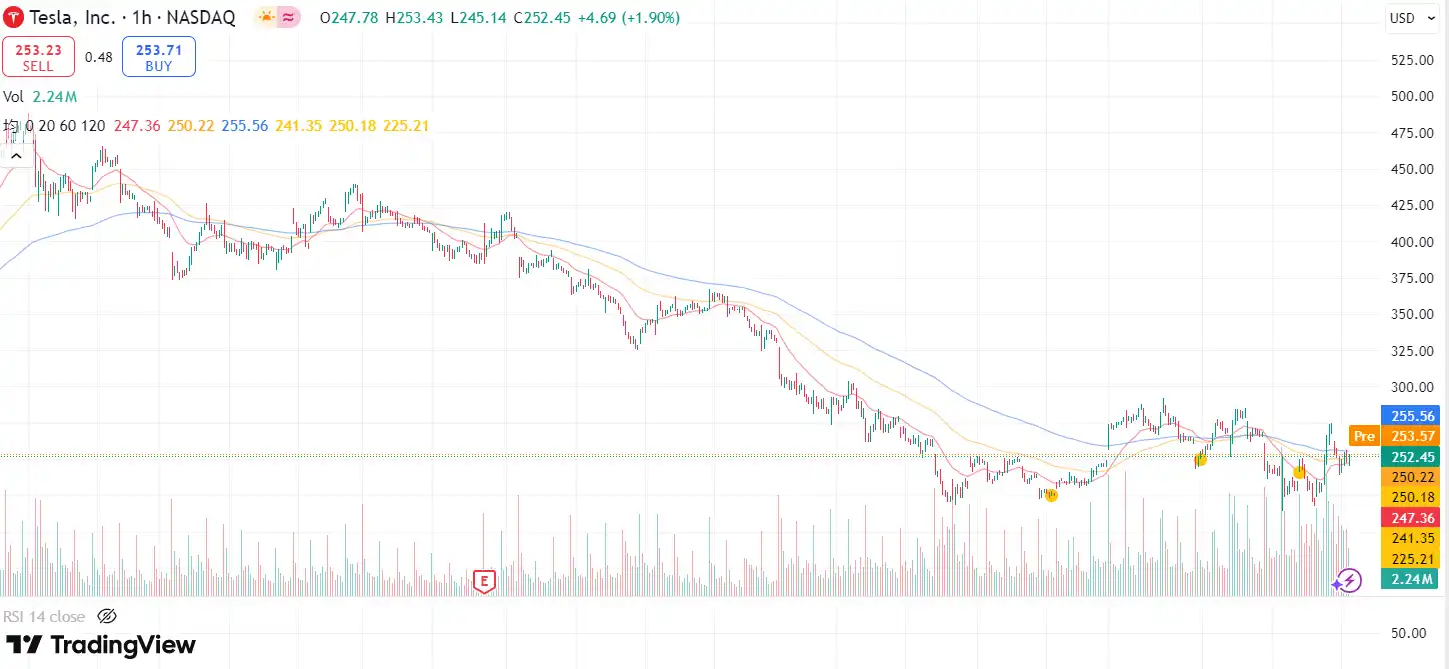
As Trump's biggest political ally and supporter, he naturally had to stand by Musk when Musk faced widespread attacks.
On March 11, local U.S. time, Trump held a 30-minute press conference in the White House driveway, which resembled a large Tesla car show—Trump, accompanied by Musk, answered questions about the U.S. stock market, Canadian tariffs, and the Russia-Ukraine war while test-driving five different types and colors of Tesla cars.
"I like that one," Trump said, pointing to a bright red Model S priced at about $80,000. Ultimately, Trump chose the Model S and stated he would write an $80,000 check to buy the car outright.
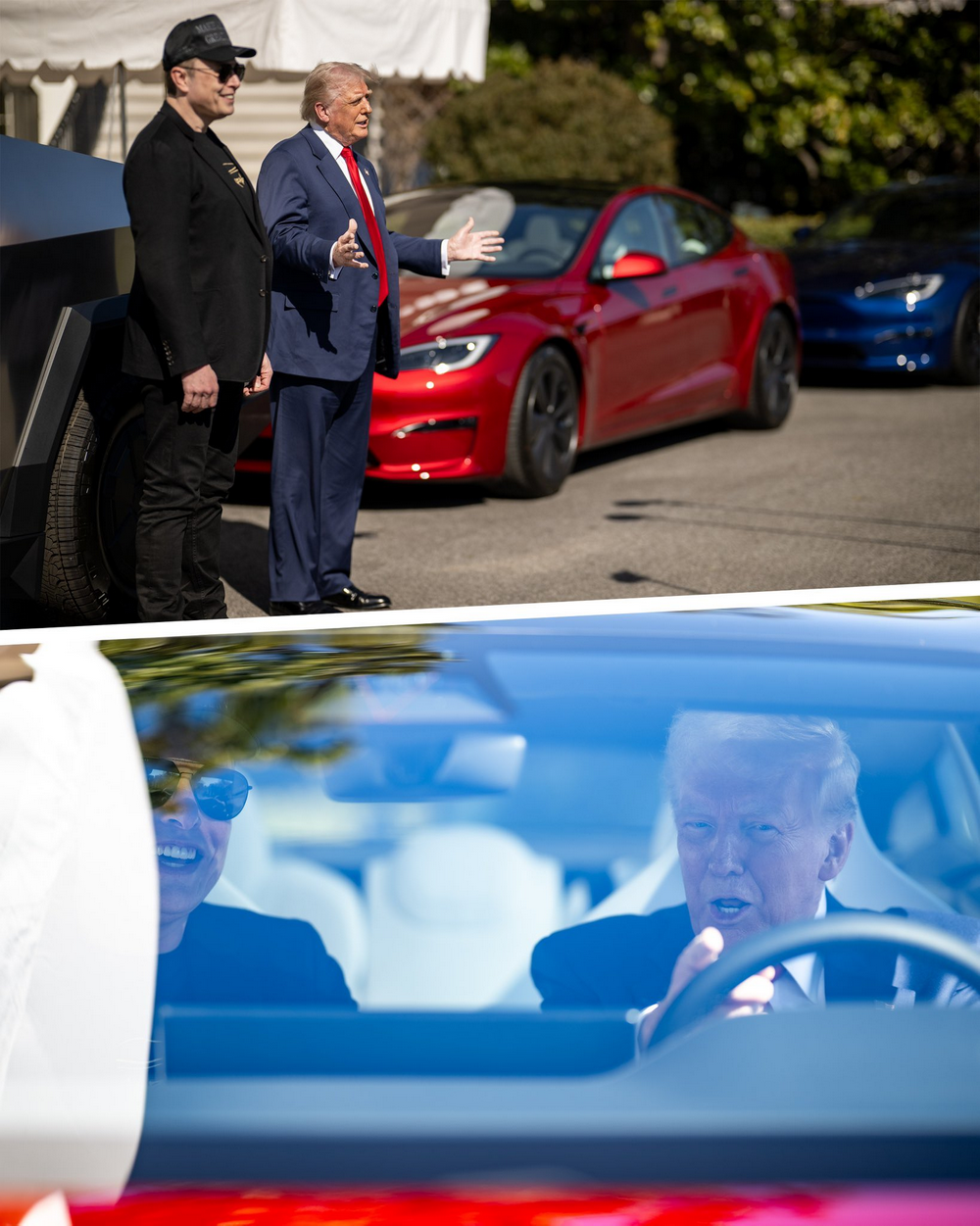
Trump also criticized those boycotting Tesla, claiming they were harming a great American company, and stated that if the boycotters continued to treat Tesla this way, he would expose them and "curse" them to "go to hell." White House spokesperson Harrison Fields also stated, "The radical left's ongoing appalling violence against Tesla is akin to domestic terrorism."
Under Trump's "endorsement," Tesla's stock rebounded during trading on Tuesday, closing up 3.79%.
To show loyalty, on March 24, during Trump's third cabinet meeting, Musk wore a red hat that read, "Trump is always right."
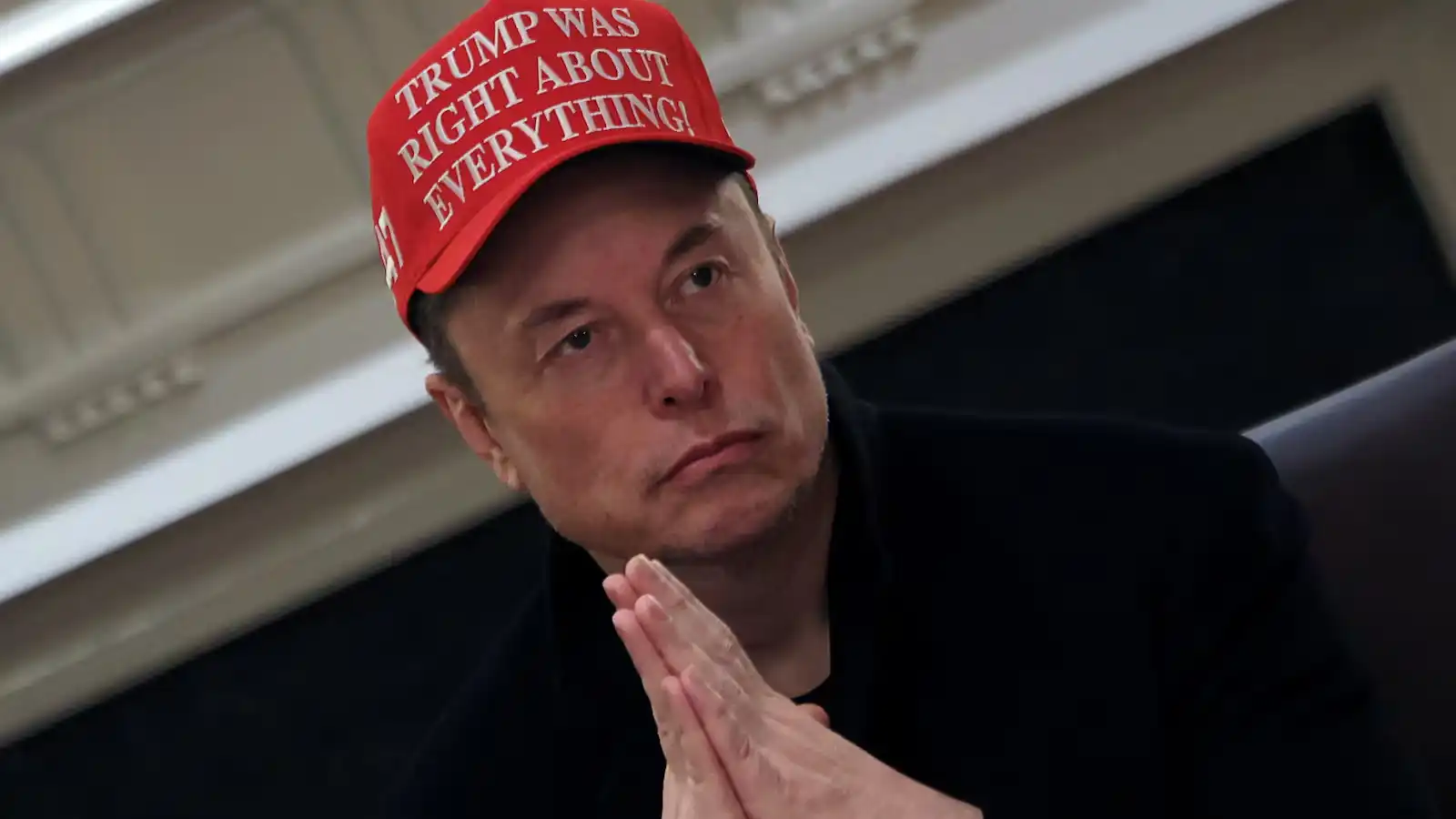
During this period, the two were still close allies committed to advancing reform, with Trump needing a "sharp blade" to expand his territory and Musk needing a platform to realize his political ambitions, aligning their goals and interests closely.
Emerging Rift: Policy Differences and Interest Games
Since Trump announced the high tariffs policy, a conflict has arisen between Trump's political goals and Musk's personal interests, leading to a rift in their relationship. The high tariffs caused a significant drop in the U.S. stock market in a short period, and Musk's assets have shrunk by over $100 billion from the beginning of the year to now. As an entrepreneur, Musk views issues from an economic efficiency perspective rather than a political one, supporting lower barriers and free trade, and he has publicly expressed his opposition to the tariff policy multiple times.
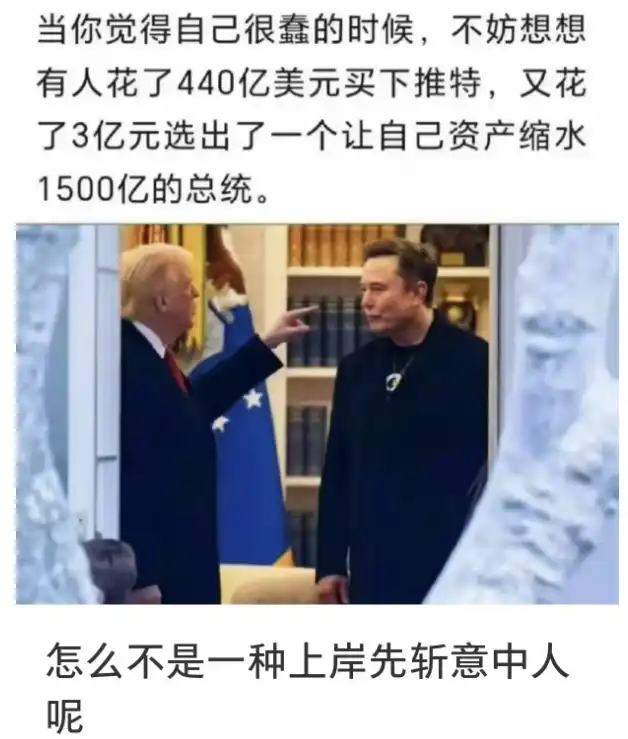
On April 5, at the Italian League conference in Florence, Musk, during a video interview with Italian Deputy Prime Minister Matteo Salvini, stated, "Ultimately, I hope Europe and the U.S. can reach an agreement; ideally, we should move towards zero tariffs to effectively establish a free trade zone between Europe and North America." On April 7, Musk shared a video on Twitter featuring the late free-market economist Milton Friedman discussing the benefits of free trade. Musk did not add any text, but this action was widely interpreted as a criticism of Trump's tariff policy.
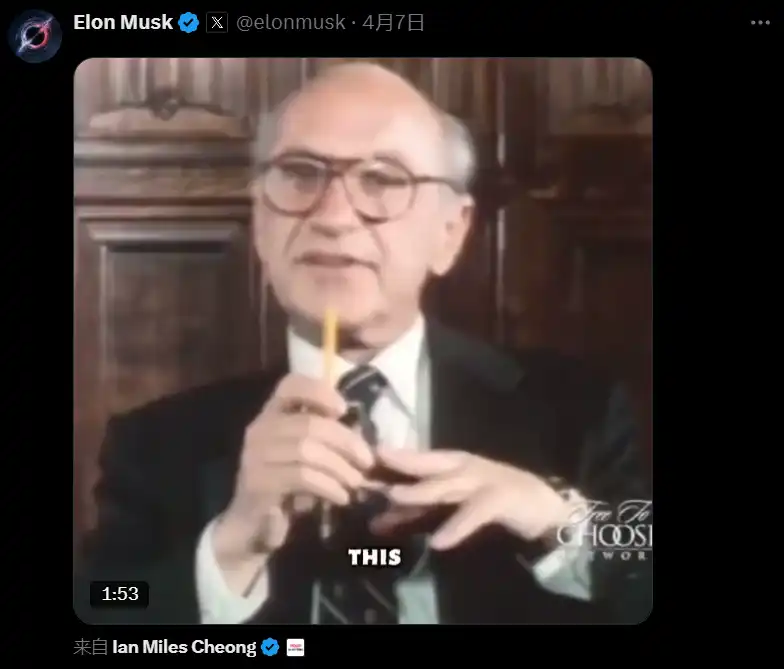
Musk's brother, Kimbal Musk, also criticized Trump's tariff policy on Twitter, pointing out that "taxing consumption means reduced consumption, which also means fewer job opportunities, leading to even less consumption and fewer job opportunities." He believes that taxation is a "structural, permanent tax on American consumers."
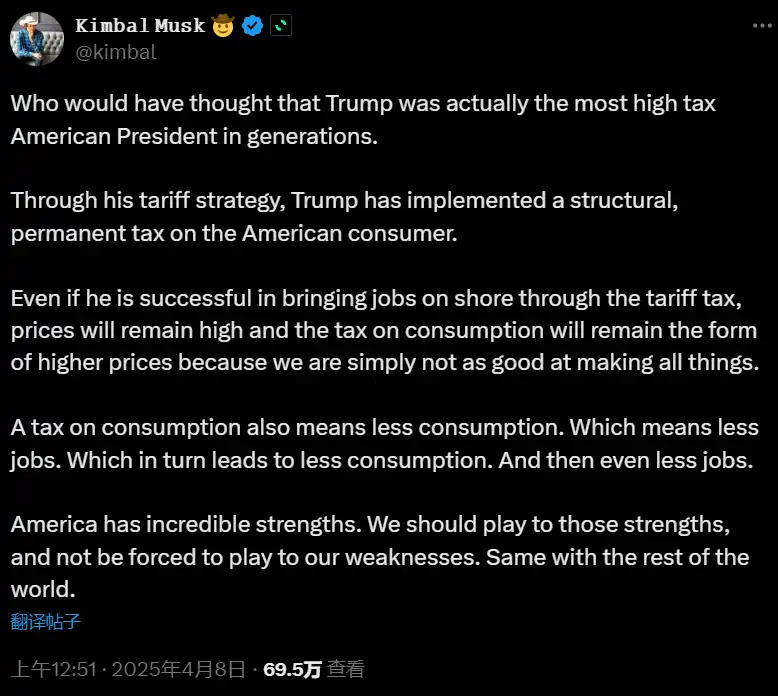
Particularly targeting trade advisor Peter Navarro, Musk has made many critical and sarcastic remarks. On April 8, he responded to a post quoting an interview with Navarro, in which Navarro claimed that Tesla is more of an "assembler" than a "manufacturer" and criticized its parts coming from China, Japan, and Taiwan. Musk directly lashed out, saying, "Navarro is such an idiot; what he said here is obviously false," and then included a community note proving that the Tesla Model Y is "the most American-made car." One rebuttal seemed insufficient, as Musk further called Navarro "dumber than a bag of bricks" in another post.
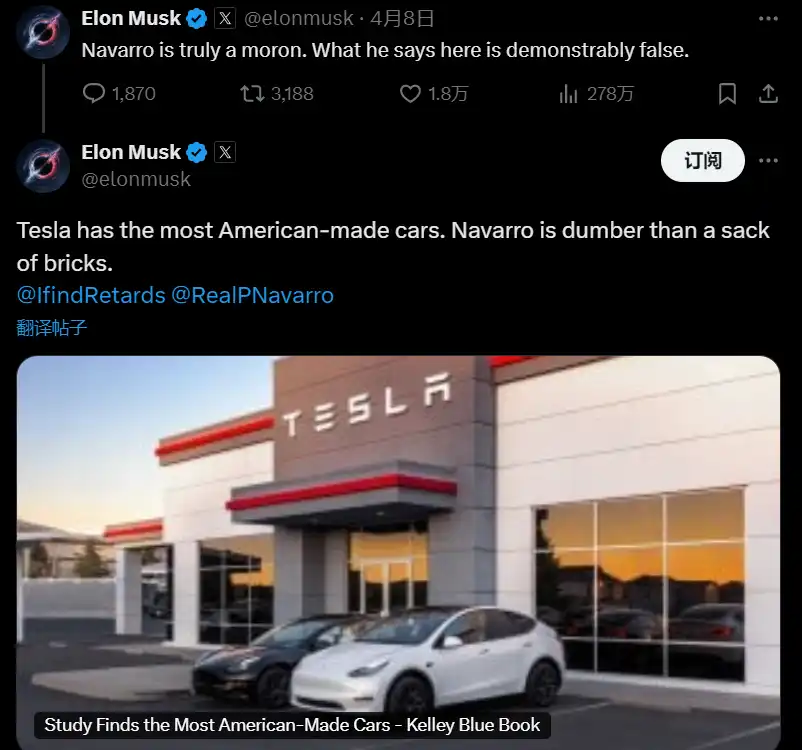
Intensifying Conflict: Basent and Musk Engage in a Heated Exchange
The conflicting attitudes of the two regarding tariffs gradually fermented in the complex power struggle.
On April 23 local time, sources reported that on April 17, Musk and Treasury Secretary Basent had a heated confrontation during a meeting in the West Wing of the White House. Basent lost his temper and shouted profanities, while Musk provocatively responded, "Speak louder." The exchange escalated to personal attacks, with Basent accusing Musk of exaggerating the budget cuts for DOGE and making no progress; Musk retorted that Basent was "Soros's puppet" and mocked him for previously failing in hedge fund management. The argument caught the attention of Trump and visiting Italian Prime Minister Meloni, and it was only after aides intervened that the two were separated.
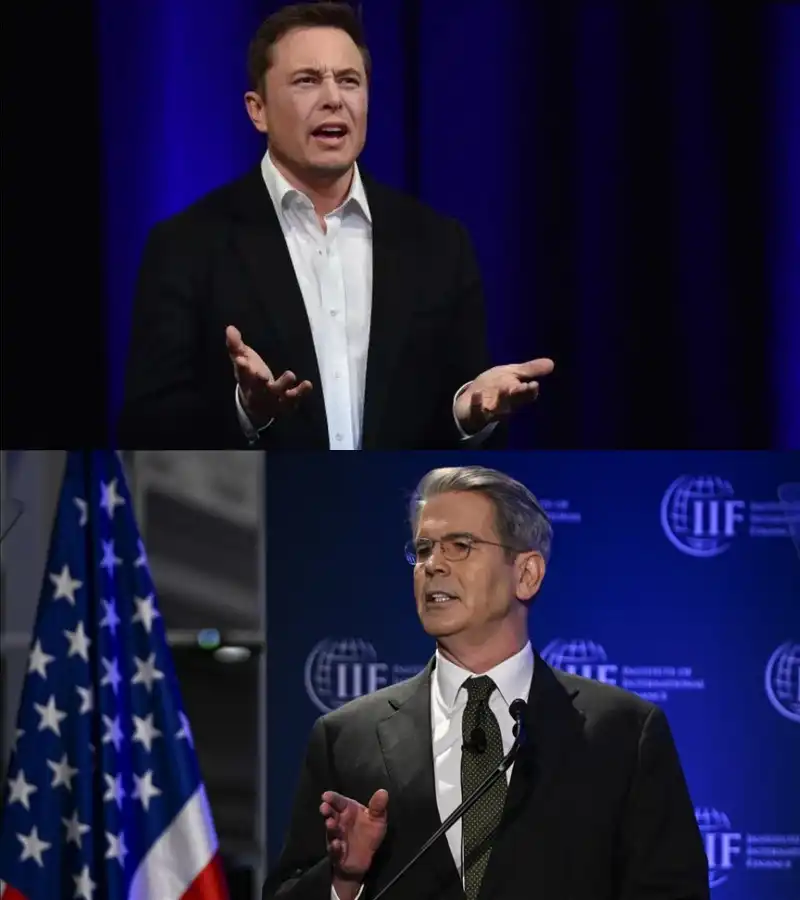
The immediate cause of this conflict was the controversy over the appointment of the IRS commissioner. As the head of the Department of Government Efficiency, Musk proposed the appointment of Gary Shapley as the acting commissioner of the IRS without the consent of Treasury Secretary Basent. Since the IRS is supposed to report to the Treasury Department, Basent viewed this move as an infringement on his authority and lobbied Trump to withdraw the appointment, instead supporting his deputy, Michael Fokend, for the IRS commissioner position.
The outcome of this struggle seems to favor Basent, as Trump ultimately supported Basent's proposal, withdrawing Musk's nomination of Shapley and appointing Fokend as the acting commissioner of the IRS.
The fact that two senior U.S. officials could become so enraged as to hurl insults at each other in front of the White House stems from their longstanding discord. As early as when Trump first took office, Musk had vigorously lobbied for the nomination of Howard Lutnick as Treasury Secretary, but Trump ultimately chose Basent and appointed Lutnick to lead the Department of Commerce. Perhaps from the beginning, Trump had set up a system of mutual checks among his subordinates, favoring whichever side aligned more closely with his views, which laid the groundwork for future conflicts.
The essence of their conflict is a power struggle and game between two factions within the Trump administration, with Musk representing the reformist faction attempting to reshape the landscape through new policies, while Basent represents the traditional faction resisting actions that threaten their interests. Trump's handling of this incident is also seen as a sign of Musk's diminishing influence within the government.
It is worth noting that regarding tariff policies, unlike Musk's clear opposition, Basent has publicly supported the tariff policies, arguing that the implementation of new tariffs in the U.S. is necessary and refuting claims that the new tariffs would lead to an economic recession. Perhaps the consistency in policy leanings is also a reason why Trump has gradually leaned towards Basent and distanced himself from Musk; after all, for a businessman like Trump, there are only permanent interests, not permanent friends.
Musk's role is limited by the 130-day service term for special government employees, which began counting from Trump's inauguration on January 20, 2025, and is expected to expire at the end of May. By the end of February, there were anonymous reports within the White House suggesting that Musk "would stay," but on March 31, Trump publicly acknowledged that Musk's business responsibilities took precedence and did not express a strong desire to retain him. Perhaps as the mission of DOGE comes to an end, Musk's 130-day government employee term is entering its countdown, and Trump will gradually phase Musk out of the power center, opting instead for new allies who better align with his current interests, evoking a sense of regret reminiscent of "the birds have flown, and the bow is hidden."
The world's richest man, Musk, experienced the thrill of "tech reforming the workplace" at the center of U.S. politics. He ignited a fire for Trump's "new administration," impacting countless interests and reforming the massive U.S. government at an incredible speed. What he leaves behind is not only the controversial prototype of "algorithmic governance" but also exposes the deep-seated contradictions between capital and power in American politics. This radical experiment of "tech transforming politics" seems to be heading towards its conclusion, and when Musk truly departs, the red hat inscribed with "Trump is always right" may become the most dramatic footnote of this brief "political marriage."
免责声明:本文章仅代表作者个人观点,不代表本平台的立场和观点。本文章仅供信息分享,不构成对任何人的任何投资建议。用户与作者之间的任何争议,与本平台无关。如网页中刊载的文章或图片涉及侵权,请提供相关的权利证明和身份证明发送邮件到support@aicoin.com,本平台相关工作人员将会进行核查。



